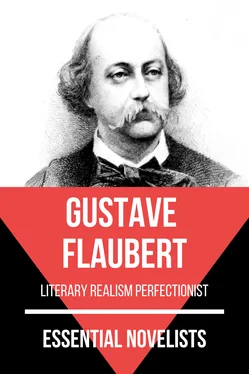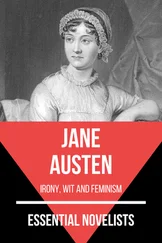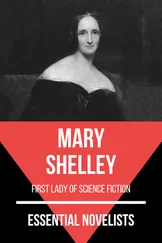“Does not this conspiracy of the world revolt you? Is there a single sentiment it does not condemn? The noblest instincts, the purest sympathies are persecuted, slandered; and if at length two poor souls do meet, all is so organised that they cannot blend together. Yet they will make the attempt; they will flutter their wings; they will call upon each other. Oh! no matter. Sooner or later, in six months, ten years, they will come together, will love; for fate has decreed it, and they are born one for the other.”
His arms were folded across his knees, and thus lifting his face towards Emma, close by her, he looked fixedly at her. She noticed in his eyes small golden lines radiating from black pupils; she even smelt the perfume of the pomade that made his hair glossy.
Then a faintness came over her; she recalled the Viscount who had waltzed with her at Vaubyessard, and his beard exhaled like this air an odour of vanilla and citron, and mechanically she half-closed her eyes the better to breathe it in. But in making this movement, as she leant back in her chair, she saw in the distance, right on the line of the horizon, the old diligence, the “Hirondelle,” that was slowly descending the hill of Leux, dragging after it a long trail of dust. It was in this yellow carriage that Leon had so often come back to her, and by this route down there that he had gone for ever. She fancied she saw him opposite at his windows; then all grew confused; clouds gathered; it seemed to her that she was again turning in the waltz under the light of the lustres on the arm of the Viscount, and that Leon was not far away, that he was coming; and yet all the time she was conscious of the scent of Rodolphe’s head by her side. This sweetness of sensation pierced through her old desires, and these, like grains of sand under a gust of wind, eddied to and fro in the subtle breath of the perfume which suffused her soul. She opened wide her nostrils several times to drink in the freshness of the ivy round the capitals. She took off her gloves, she wiped her hands, then fanned her face with her handkerchief, while athwart the throbbing of her temples she heard the murmur of the crowd and the voice of the councillor intoning his phrases. He said—“Continue, persevere; listen neither to the suggestions of routine, nor to the over-hasty councils of a rash empiricism.
“Apply yourselves, above all, to the amelioration of the soil, to good manures, to the development of the equine, bovine, ovine, and porcine races. Let these shows be to you pacific arenas, where the victor in leaving it will hold forth a hand to the vanquished, and will fraternise with him in the hope of better success. And you, aged servants, humble domestics, whose hard labour no Government up to this day has taken into consideration, come hither to receive the reward of your silent virtues, and be assured that the state henceforward has its eye upon you; that it encourages you, protects you; that it will accede to your just demands, and alleviate as much as in it lies the burden of your painful sacrifices.”
Monsieur Lieuvain then sat down; Monsieur Derozerays got up, beginning another speech. His was not perhaps so florid as that of the councillor, but it recommended itself by a more direct style, that is to say, by more special knowledge and more elevated considerations. Thus the praise of the Government took up less space in it; religion and agriculture more. He showed in it the relations of these two, and how they had always contributed to civilisation. Rodolphe with Madame Bovary was talking dreams, presentiments, magnetism. Going back to the cradle of society, the orator painted those fierce times when men lived on acorns in the heart of woods. Then they had left off the skins of beasts, had put on cloth, tilled the soil, planted the vine. Was this a good, and in this discovery was there not more of injury than of gain? Monsieur Derozerays set himself this problem. From magnetism little by little Rodolphe had come to affinities, and while the president was citing Cincinnatus and his plough, Diocletian, planting his cabbages, and the Emperors of China inaugurating the year by the sowing of seed, the young man was explaining to the young woman that these irresistible attractions find their cause in some previous state of existence.
“Thus we,” he said, “why did we come to know one another? What chance willed it? It was because across the infinite, like two streams that flow but to unite; our special bents of mind had driven us towards each other.”
And he seized her hand; she did not withdraw it.
“For good farming generally!” cried the president.
“Just now, for example, when I went to your house.”
“To Monsieur Bizat of Quincampoix.”
“Did I know I should accompany you?”
“Seventy francs.”
“A hundred times I wished to go; and I followed you—I remained.”
“Manures!”
“And I shall remain to-night, to-morrow, all other days, all my life!”
“To Monsieur Caron of Argueil, a gold medal!”
“For I have never in the society of any other person found so complete a charm.”
“To Monsieur Bain of Givry-Saint-Martin.”
“And I shall carry away with me the remembrance of you.”
“For a merino ram!”
“But you will forget me; I shall pass away like a shadow.”
“To Monsieur Belot of Notre-Dame.”
“Oh, no! I shall be something in your thought, in your life, shall I not?”
“Porcine race; prizes—equal, to Messrs. Leherisse and Cullembourg, sixty francs!”
Rodolphe was pressing her hand, and he felt it all warm and quivering like a captive dove that wants to fly away; but, whether she was trying to take it away or whether she was answering his pressure; she made a movement with her fingers. He exclaimed—
“Oh, I thank you! You do not repulse me! You are good! You understand that I am yours! Let me look at you; let me contemplate you!”
A gust of wind that blew in at the window ruffled the cloth on the table, and in the square below all the great caps of the peasant women were uplifted by it like the wings of white butterflies fluttering.
“Use of oil-cakes,” continued the president. He was hurrying on: “Flemish manure-flax-growing-drainage-long leases-domestic service.”
Rodolphe was no longer speaking. They looked at one another. A supreme desire made their dry lips tremble, and wearily, without an effort, their fingers intertwined.
“Catherine Nicaise Elizabeth Leroux, of Sassetot-la-Guerriere, for fifty-four years of service at the same farm, a silver medal—value, twenty-five francs!”
“Where is Catherine Leroux?” repeated the councillor.
She did not present herself, and one could hear voices whispering—
“Go up!”
“Don’t be afraid!”
“Oh, how stupid she is!”
“Well, is she there?” cried Tuvache.
“Yes; here she is.”
“Then let her come up!”
Then there came forward on the platform a little old woman with timid bearing, who seemed to shrink within her poor clothes. On her feet she wore heavy wooden clogs, and from her hips hung a large blue apron. Her pale face framed in a borderless cap was more wrinkled than a withered russet apple. And from the sleeves of her red jacket looked out two large hands with knotty joints, the dust of barns, the potash of washing the grease of wools had so encrusted, roughened, hardened these that they seemed dirty, although they had been rinsed in clear water; and by dint of long service they remained half open, as if to bear humble witness for themselves of so much suffering endured. Something of monastic rigidity dignified her face. Nothing of sadness or of emotion weakened that pale look. In her constant living with animals she had caught their dumbness and their calm. It was the first time that she found herself in the midst of so large a company, and inwardly scared by the flags, the drums, the gentlemen in frock-coats, and the order of the councillor, she stood motionless, not knowing whether to advance or run away, nor why the crowd was pushing her and the jury were smiling at her.
Читать дальше












